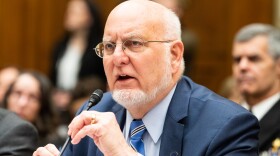
Carrie Feibel
Carrie Feibel is a senior editor on NPR's Science Desk, focusing on health care. She runs the NPR side of a joint reporting partnership with Kaiser Health News, which includes 30 journalists based at public radio stations across the country.
Previously, Feibel was KQED's health editor in San Francisco and the health and science reporter at Houston Public Radio. She has covered abortion policy and politics, the Affordable Care Act, the medical risks of rodeo, the hippie roots of the country's first " free clinic" and the evolution of drug education in the age of legal weed.
Feibel graduated from Cornell University and has a master's degree in journalism from Columbia University. In her print career, she worked at The (Bergen) Record and the Herald News in New Jersey, the Houston Chronicle and the Associated Press. She is currently a board member of the Association of Health Care Journalists.
Feibel was part of the coverage of Hurricane Ike, for which the Houston Chronicle was named a Pulitzer Prize finalist. At KQED, she edited a half-hour radio show on U.S. refugee policy that won an award in explanatory journalism from the Society of Professional Journalists.
-
After weeks of keeping a low profile, the CDC's Dr. Robert Redfield tells NPR that data will determine future recommendations for wearing masks or easing back on social distancing.
-
The CDC expects the number of confirmed cases of Wuhan coronavirus in the U.S. to increase — but says the overall health risk of disease transmission in the country is low.
-
Today's drug prevention messaging is a far cry from the "Just Say No" days. Schools want to give kids the facts to make informed decisions about whether and when to try drugs or alcohol.
-
Sandeep Dhaliwal emerged as a symbol of religious diversity in law enforcement as the first Sikh to become a sheriff's deputy in Harris County. "He was a unifying symbol," a city official said.
-
With the full House on recess, the House Intelligence Committee could start hearings within days into President Trump's contacts with Ukraine.
-
Fifty years ago a community health clinic first opened its doors as a safe, sympathetic space for countercultural youth. Today its motto is the same: "Health care is a right, not a privilege."
-
Terminally ill patients want easier access to candidate medicines still in the earliest stages of testing. While 33 states have passed laws to enable that, ethicists also warn of big risks.
-
Accredited medical residency programs have to teach doctors how to perform abortions. But interpretation of the requirement varies, especially in a state like Texas where training options are scarce.
-
The hostile climate surrounding abortion in Texas has made it hard for doctors in training to learn to do abortions. Professors feel intimidated, and there are fewer clinics where residents can train.
-
Harris County, Texas, operates one of the largest mosquito control operations in the country, with more than 50 people who trap, freeze and test mosquitoes for disease threats.









